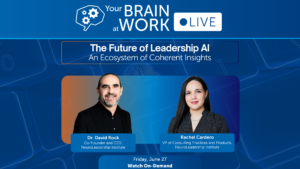A new year doesn’t necessarily mean a clean slate. The disruptions of 2020 have followed us into 2021, so it’s fortunate that we can bring the lessons of 2020 into 2021. One thing we at the NeuroLeadership Institute learned is this: You might be neglecting the psychological needs of your team.
In the spring of 2020, early in the pandemic, our poll of nearly 700 employees across the US, in different industries, at different professional levels, found that while many business leaders were most worried about productivity, employees were just worried. Sixty-five percent reported feeling generally anxious.
We published our findings in “The Mind in Crisis: Understanding Employees’ Needs in a Changed Workplace.” This idea report includes the case of one organization that successfully meets the challenges of this unprecedented time. We discuss one key takeaway here.
Because anxiety has real implications for productivity, we have to address it before we can begin to address productivity.
Starved for certainty
NLI’s SCARF® (Status, Certainty, Autonomy, Relatedness, Fairness) model is a framework for understanding human motivation toward safety.
Our 2020 research found three SCARF dimensions that closely correlated with employees’ confidence in their organization’s survival. This was true regardless of how employees were personally affected by changes wrought by stay-at-home orders and other responses to the COVID-19 pandemic. Certainty is one dimension that contributes to our sense of well being, a basic human need. The hunger for certainty can manifest as anxiety. Employees’ concerns about their own well-being and their organizations’ viability could become self-fulfilling prophecies.
Certainty means having the information to predict and prepare for whatever comes next. So much of life in 2020 was described as unprecedented. There’s been no precedent to imagine what could be next, nothing on which to predicate a plan. Without certainty, people’s minds often fixate on worst-case scenarios, robbing them of the cognitive power to be productive. Without certainty, the capacity to focus, collaborate, and solve problems is greatly diminished just when people, and organizations, need those abilities the most.
Provide clarity
Like certainty, clarity can reduce the sense of threat to help improve focus. Clear information on possibilities and timelines, anchored on principle, can help alleviate anxiety.
Articulate a clear set of principles to work from, whether they’re your founding mission or principles developed to meet the moment. This helps assure your employees know that even if circumstances change, your values won’t.
Limit possibilities and remove variables to prevent employees becoming mired in “what ifs.” Provide timelines so employees won’t be hyper vigilant waiting for the other shoe to drop
Announce, for example, that because you value safety, your team can work remotely and you’ll reassess the situation in six months. When anxiety about income, child care, and viral exposure doesn’t tax cognitive capacity, they are able to be productive.
Ensure you’re not neglecting your team. Learn how PURE insurance meets their employees’ needs in our idea report.
[action hash= “638a5f77-c66e-49e6-b610-592c6dc17ae6”]






